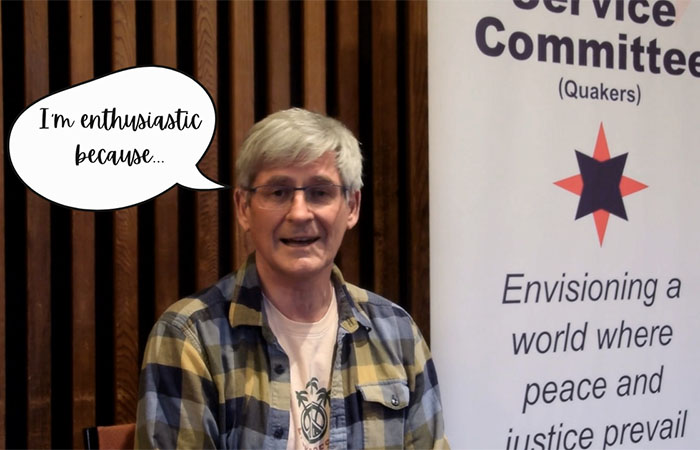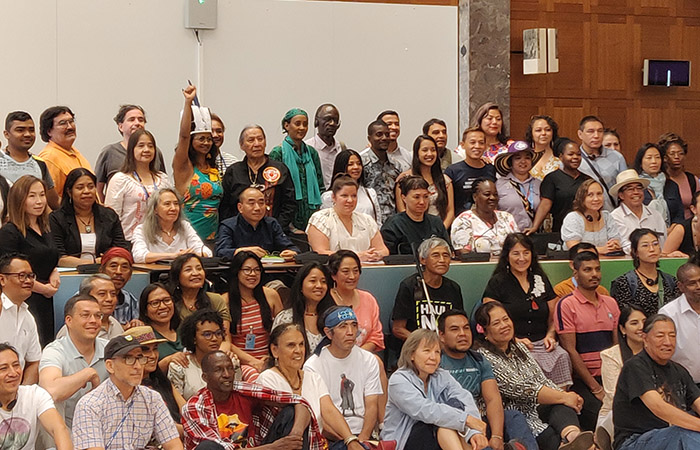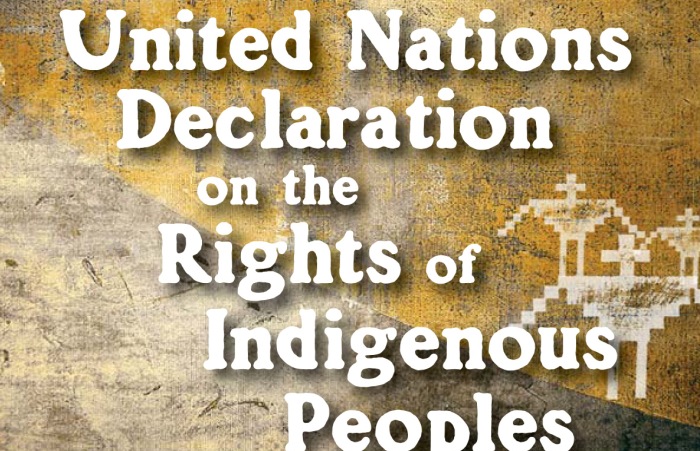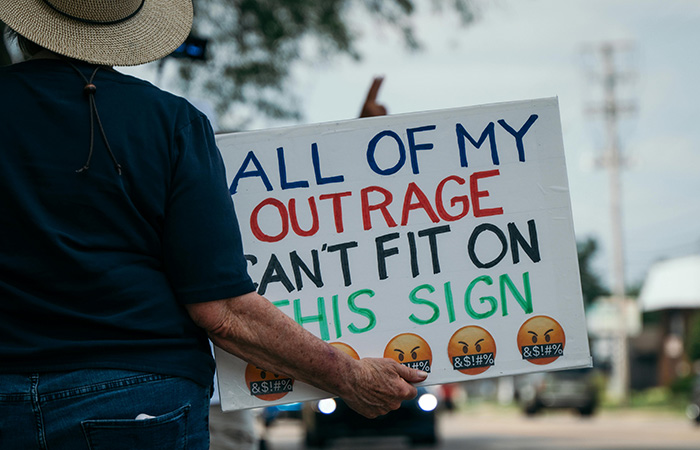
Video: Why are Canadian Quakers volunteering for justice and peace?
July 12, 2023
The incredible power of listening
August 1, 2023![]() We were pleased to join with the Coalition for the Human Rights of Indigenous Peoples to deliver three joint statements at the United Nations in Geneva during the meetings of the Expert Mechanism on the Rights of Indigenous Peoples. The text of all three joint statements is below.
We were pleased to join with the Coalition for the Human Rights of Indigenous Peoples to deliver three joint statements at the United Nations in Geneva during the meetings of the Expert Mechanism on the Rights of Indigenous Peoples. The text of all three joint statements is below.
Item 10: Intersessional activities and follow-up to thematic studies and advice
Wednesday, 19 July 2023
Joint Statement of the Coalition for the Human Rights of Indigenous Peoples (Canada): Grand Council of the Crees (Eeyou Istchee) Cree Nation Government; Amnistie Internationale Canada Francophone; British Columbia Treaty Commission; Canadian Friends Service Committee (Quakers); First Nations Summit; KAIROS (Canada); Union of British Columbia Indian Chiefs; Cheryl Knockwood, Chair, Nova Scotia Human Rights Commission; Ellen Gabriel, Kanehsatake Land Defender; Hup-Wil-Lax-A, Kirby Muldoe, Grassroots Human Rights Defender; Lea Nicholas-MacKenzie; Dr. Willie Littlechild, KC, IPC (International Chief for Treaties 6,7and 8)
We thank EMRIP for your 2018 study on Free, Prior and Informed Consent: a human-rights based approach, which was adopted by the Human Rights Council at its 39th session.
We would like to follow-up this report with a recommendation:
- That EMRIP remind States of the meaning of FPIC in international law, and reiterate State responsibilities when resource development is being proposed in or affecting the lands and territories of Indigenous peoples.
- That EMRIP further articulate the conclusions from its FPIC study in this regard.
For further context and information please see the 2019 joint statement of the Coalition for the Human Rights of Indigenous Peoples (Canada): https://www.declarationcoalition.com/wp-content/uploads/2022/03/Coalition-statement-to-EMRIP-on-FPIC-July-15-2019.pdf

Members at Indigenous Caucus, EMRIP, 2023
Item 9: Report Establishing Effective Monitoring Mechanisms for the Implementation of the United Nations Declaration on the Rights of Indigenous Peoples
Thursday, 20 July 2023
Joint Statement of the Coalition for the Human Rights of Indigenous Peoples (Canada): Grand Council of the Crees (Eeyou Istchee) Cree Nation Government; Amnistie Internationale Canada Francophone; British Columbia Treaty Commission; Canadian Friends Service Committee (Quakers); First Nations Summit; KAIROS (Canada); Union of British Columbia Indian Chiefs; Cheryl Knockwood, Chair, Nova Scotia Human Rights Commission; Ellen Gabriel, Kanehsatake Land Defender; Hup-Wil-Lax-A, Kirby Muldoe, Grassroots Human Rights Defender; Lea Nicholas-MacKenzie; Dr. Willie Littlechild, KC, IPC (International Chief for Treaties 6,7and 8)
Thank you for this opportunity to share our work in Canada on monitoring the implementation of the United Nations Declaration on the Rights of Indigenous Peoples. We wish to thank the Expert Mechanism for the focus on this important issue through its substantive draft report and we encourage States to fully engage with this timely draft report.
We recommend that:
EMRIP urge States to centre Indigenous peoples in the drafting and implementation of any National Action Plans in accordance with the standards of the Declaration.
Enhanced collaboration between civil society, academia, UN bodies, governments and Indigenous peoples be supported to advance the implementation of the Declaration.
We were pleased to support the Expert Mechanism’s Seminar in Canada at the University of British Columbia this winter on the subject of Monitoring Mechanisms, and are grateful for the many informative and thoughtful contributions made during that seminar.
National Action Plan
After years of opposition to the Declaration, in 2021 Canada became one of the first Member States to pass national legislation to fully implement the Declaration, which included the requirement of a national action plan. The significance of this cannot be understated.
The release of this national action plan marks a promising – but flawed – beginning to Canada’s implementation of the Declaration.
This is the first action plan to be created under the implementation act and commits to numerous, important reforms and initiatives brought forward by Indigenous peoples.
However, the plan also includes significant inconsistencies, from section to section and in respect to the actual requirements of the Declaration itself.
One of the most concerning of these is the repeated reference to “seeking the consent” of Indigenous peoples. As noted in paragraph 15 of EMRIP’s draft report, the Declaration affirms Indigenous peoples’ right to self-determination, including the right to grant or withhold consent to proposals that may have significant impact on their rights. Expert interpretation of the Declaration is clear that states must do more than “seek consent”: states must respect the decisions that Indigenous peoples make for themselves, including when that decision is to say “no”. States cannot develop action plans with lower standards than the Declaration itself.
Current inconsistencies in the federal action plan reflect the misunderstanding and resistance to the Declaration that still linger inside many corners of government. This is why it is critical that strong oversight and accountability systems be put in place as soon as possible to ensure meaningful, ongoing involvement of Indigenous peoples in bringing this action plan to life.
We recognize Canada’s efforts in releasing this National Action Plan, and indeed Canada is the first country to release such a plan. The Province of British Columbia also recently released their third annual report on the implementation of the Declaration.
As stated in EMRIP’s draft report, “To achieve the ends of the Declaration, it is important to view monitoring as a collaborative effort involving States, Indigenous peoples, national human rights institutions, academia and international organizations.” As a diverse Coalition of civil-society organizations and Indigenous peoples, we are honoured to assist in awareness-raising, lobbying and advocacy for the implementation of the Declaration.
Network Project
As noted in Section V of EMRIP’s draft report, “the kind of systemic changes required to operationalize the Declaration at the local level cannot ultimately be achieved without involvement of society at large.” Our Coalition is pleased to be advancing this work in Canada and globally by assisting in a global research project. This project is aimed at bringing together the resources of activists, community organizations, and academics to hear the views of Indigenous Nations and individuals on the Declaration.
Thus far, research engagements have been held in Haida Gwaii, Kahnawake, Kanehsatà:ke, and Samson Cree Nation. Soon this project will hear from Indigenous peoples in Sápmi and Aotearoa.
Building on the relationships of Coalition members, this research has allowed the Coalition to gain greater insight into how the Declaration can be implemented directly in community, in accordance with the language, laws, and culture of Indigenous nations.
As a Coalition, we have many resources and other ongoing projects on monitoring the implementation of the Declaration in Canada, for further reference please see our many resources on implementation on our website: DeclarationCoalition.ca
Item 12: Future work of the Expert Mechanism, including thematic studies
Joint Statement of the Coalition for the Human Rights of Indigenous Peoples (Canada): Grand Council of the Crees (Eeyou Istchee) Cree Nation Government; Amnistie Internationale Canada Francophone; British Columbia Treaty Commission; Canadian Friends Service Committee (Quakers); KAIROS (Canada); First Nations Summit; Métis National Council; Union of British Columbia Indian Chiefs; Upper Nicola Band, Chief Daniel Manuel; Cheryl Knockwood, Chair, Nova Scotia Human Rights Commission; Ellen Gabriel, Kanehsatake Land Defender; Hup-Wil-Lax-A, Kirby Muldoe, Grassroots Human Rights Defender; Lea Nicholas-MacKenzie; Dr. Willie Littlechild, KC, IPC (International Chief for Treaties 6,7and 8)
We are pleased to present the following Joint Statement on behalf of a number of Indigenous Nations and organizations, as well as human rights organizations in Canada. This statement addresses EMRIP’s future work, and we would kindly like to request a thematic study concerning Indigenous peoples’ land rights, including the effects of the growing climate crisis, and redress and restitution for Indigenous peoples’ lands, territories, and resources.
Globally, Indigenous peoples are on the front lines of the climate crisis, experiencing catastrophic fires, flooding, erosion, drought, biodiversity loss, and other climate-related impacts. We also know that Indigenous peoples have been – and continue to be – dispossessed of, and displaced from, their lands, territories and resources without their free, prior and informed consent. As highlighted in the sixth preambular paragraph of the United Nations Declaration on the Rights of Indigenous Peoples, States recognize that Indigenous peoples have suffered from “historic injustices as a result of, inter alia, their colonization and dispossession of their lands, territories and resources, thus preventing them from exercising, in particular, their right to development in accordance with their own needs and interests.” The growing climate crisis is exacerbating these historic injustices with serious consequences for Indigenous peoples’ and individuals’ ability to freely and fully exercise their rights.
As the United Nations has highlighted in 2020:
Climate change is the defining crisis of our time and it is happening even more quickly than we feared. But we are far from powerless in the face of this global threat. As Secretary-General António Guterres pointed out in September, “the climate emergency is a race we are losing, but it is a race we can win”.
No corner of the globe is immune from the devastating consequences of climate change. Rising temperatures are fuelling environmental degradation, natural disasters, weather extremes, food and water insecurity, economic disruption, conflict, and terrorism. Sea levels are rising, the Arctic is melting, coral reefs are dying, oceans are acidifying, and forests are burning. It is clear that business as usual is not good enough. As the infinite cost of climate change reaches irreversible highs, now is the time for bold collective action.[1]
The UN Declaration offers a promise of protection in light of the impacts of the climate crisis, notably through Indigenous peoples’ right to redress to their lands and territories, as affirmed throughout the UN Declaration, including in Articles 8, 27, 28, and 32. Both Indigenous peoples and individuals have the right to security – and both have the right not to be subjected to forced assimilation or destruction of culture (Articles 7 and 8).
In this whole context, Indigenous peoples’ right to self-determination must be actively encouraged and respected by States and others – and not dismissed, devalued or ignored. Yet dispossession of their lands, territories and resources continue to be at the core of Indigenous peoples’ struggle for their human rights. For example, a recent report from Canada states, “These losses [of lands, territories and resources] are the result of false, racist premises such as terra nullius and the doctrines of discovery and denial which provided colonial governments justification for appropriating valuable land for which they had no legal or moral right.” [2]
On top of these historic injustices, there are very few, if any, effective mechanisms for land redress and restitution. Some mechanisms provide ineffective redress in the form of monetary compensation only, instead of restoring lands, territories and resources. Other mechanisms that purport to offer the return of lands, territories and resources are generally frustrated by delays, lack of resourcing, and the privileging of third-party interests. In addition, there are very few, if any, mechanisms that address the issue of redress or restitution related to lands, territories or resources impacted by environmental change.
And yet, we also know that Indigenous peoples’ renewed stewardship and care for their lands, territories and resources are at the heart of solutions to the expanding climate emergency that affects us all.[3] We know that Indigenous-led solutions offer hope in the face of the environmental challenges we are facing today.
In Canada, recent years have demonstrated that the climate catastrophe is not some far-off concern. Rather, it is urgent for Indigenous peoples – whose lands are drastically impacted by erosion, fires, and floods – to have climate justice. Instead, Indigenous peoples continue to be evacuated from their homes due to unprecedented wildfires and floods related to the growing climate crisis.
However, we know that some of these impacts can be mitigated by Indigenous peoples’ own stewardship of their lands, territories and resources through the exercise of Indigenous peoples’ own laws and systems of governance. This is demonstrated, for example, in the work of the Local Communities and Indigenous Peoples Platform of the UN Framework Convention on Climate Change.[4]
We welcome and encourage a thematic study from EMRIP on the matter of the increasing climate crisis and the urgent need for redress and restitution for Indigenous peoples’ lands, territories, and resources. We know that Indigenous peoples’ lands and territories are at the heart of their survival, especially in the face of climate catastrophe and we urge EMRIP to take this matter under careful consideration.
What is needed is climate justice, which looks at the climate crisis through a human rights lens and on the belief that by working together we can create a better future for present and future generations.[5]
[1] United Nations, “The Climate Crisis – A Race We Can Win”, 2020, https://www.un.org/sites/un2.un.org/files/2020/01/un75_climate_crisis.pdf
[2] See, Union of BC Indian Chiefs, “Severed Connections: The Unacknowledged Costs of Specific Claims”, 2023. Available in print only.
[3] See, World Conference on Indigenous Peoples Outcome Document paragraph 35 (in relation to sustainable management) and 36 (Indigenous knowledge in mitigation and adaptation)
[4] United Nation Framework Convention on Climate Change (Subsidiary Body for Scientific and Technological Advice), Decision 2/CP24, Local Communities and Indigenous Peoples Platform, FCCC/CP/2018/10/Add.1 (30 December 2018).
[5] See, “Climate Justice”, https://www.un.org/sustainabledevelopment/blog/2019/05/climate-justice/.
Learn more about the human rights of Indigenous peoples.




